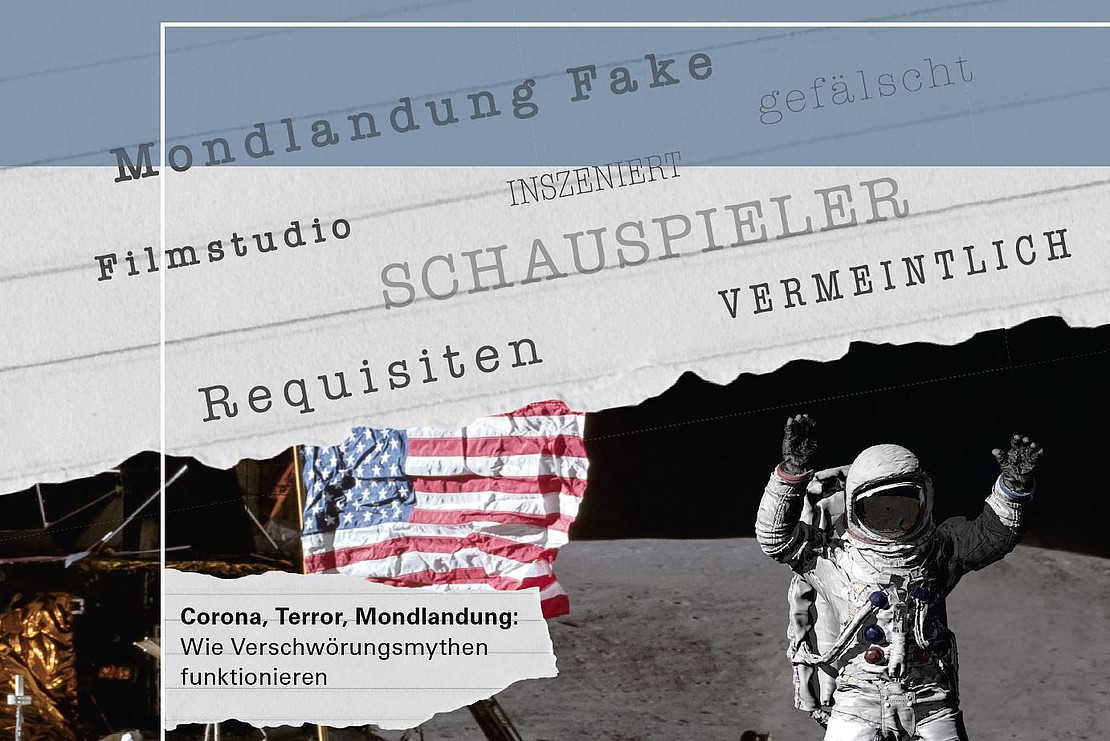This page contains automatically translated content.
Alarm system for conspiracy theories

The twin towers of the World Trade Center in New York were blown up by the US government in 2001. It's also quite clear that the images of the first moon landing were taken in a studio and, of course, the contrails of airplanes are spraying toxins to control our minds. There have always been conspiracy myths like these, but with the constant barrage of social media and digital echo chambers, these narratives emerge and spread more easily than ever. They are not always as easy to see through as the "chemtrails" claim. What can be done? The Kassel-based German scholar Prof. Dr. David Römer takes an original approach. Using linguistic means, he provides society with a method for recognizing language and argumentation patterns in conspiracy theory texts.
Because some conspiracy myths can be laughed at - others are better not. At the end of last year, the "Reichsbürger" raids cast a harsh light on a milieu that cultivates the idea that the Federal Republic of Germany is not a legitimate state and that the constitution of the German Empire is still in force. "The spread of conspiracy theories often goes hand in hand with the radicalization of certain social groups," says Römer, which makes them a destabilizing factor for society. Three years ago, the Friedrich Ebert Foundation found in a study that around a third of 1,900 people surveyed believed that politicians were puppets of other powers. "This is just one reason why we need to take seriously the fact that people believe in conspiracy theories and why we should be concerned with knowledge about supposed conspiracies, regardless of the question of their validity," Römer continued. "We gain access to this knowledge through language."
In a project funded by the DFG, Römer is evaluating texts by machine, among other things: Party programs, postings on social media, comments under YouTube videos. Topics include conspiracy theories about man-made climate change, the attack on the Christmas market at Breitscheidplatz in Berlin and migration. On several levels, he registered certain linguistic patterns in texts that question general convictions - Römer speaks of "orthodox knowledge". In the vocabulary: "There is a vocabulary that is specific to conspiracy theory contexts," says Römer. In research, it is called "debunking vocabulary" because it is used by the speaker or author of a text to declare recognized knowledge as "false". This includes accumulations of negation words such as "not" and "no" and relativizing terms such as "allegedly", "supposedly", "strange". In purely quantitative terms, it was found that such words occur up to ten times more frequently in the relevant texts than in the general vocabulary. On a metaphorical level: terms from one area are often transferred to another in order to reinterpret them. Römer speaks of "conceptual metaphors" and cites the discussion about man-made climate change as an example. People who questioned this used "terms from the religious sphere to discredit scientific findings. The talk is then of climate disciples, climate dogmas or doctrines of faith, where it is actually about the realm of knowledge."
In argumentation patterns: Prevailing knowledge is discredited by a small-scale argumentation on an (allegedly) scientific level. For example, theories are circulating that the steel frame of the World Trade Center should have been able to withstand the debris damage and fires, which is why only a targeted demolition could have led to the collapse. Römer: "Pseudo-scientific arguments in particular are almost impossible for laypeople to verify." The "Language in conspiracy theories" project is funded by the DFG. Römer emphasizes that his method provides clues; it is no substitute for a substantive debate. It is also important to him to emphasize that dissent and contradiction to prevailing knowledge should not be rejected per se - ultimately, science also thrives on it. However, positions that threaten democracy must be dealt with.
This article appeared in the university magazine publik 2023/1. Text: Sebastian Mense